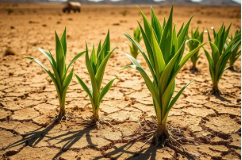
In a strategic policy shift aimed at enhancing energy security and managing surplus grain stocks, the Government of India has approved the diversion of excess rice from the central pool for ethanol production under its biofuel programme. The move is expected to accelerate India’s target of achieving 20% ethanol blending in petrol by 2025, while also helping to stabilise foodgrain stock levels.
According to a statement from the Ministry of Consumer Affairs, Food and Public Distribution, the rice being used is “notified as surplus” and is unfit for public distribution schemes such as the National Food Security Act (NFSA). This surplus rice will now be supplied to distilleries for conversion into ethanol.
A Dual-Benefit Strategy
Officials say the decision is part of a broader strategy to balance agricultural production with green energy needs. India has consistently produced large surpluses of rice, particularly in years with strong monsoons. Storing this excess grain poses logistical and financial challenges for the Food Corporation of India (FCI).
“Utilising surplus rice for ethanol allows us to manage stocks more efficiently while supporting our clean fuel targets,” a senior government official said. “It’s a win-win farmers continue to benefit from MSP procurement, and the ethanol sector gets a reliable raw material.”
Boost to Ethanol Blending Programme
India’s Ethanol Blending Programme (EBP) is a key component of its strategy to reduce dependence on fossil fuels, curb carbon emissions, and cut crude oil imports. With the blending level already above 12% as of mid-2025, the use of surplus food grains like rice and maize is expected to push the country closer to the 20% target.
Oil marketing companies (OMCs) have been directed to prioritise ethanol sourced from rice and maize for blending with petrol. The government is also encouraging the setting up of grain-based ethanol plants, especially in states like Uttar Pradesh, Bihar, Punjab, and Chhattisgarh.
Criticism and Safeguards
While the policy has been welcomed by the biofuel industry, some food security advocates have raised concerns about diverting edible grains for fuel. In response, the government clarified that only non-edible grade and excess stocks will be used, and buffer norms for food security will not be compromised.
“The rice being diverted is not suitable for human consumption and is over and above what is required under welfare schemes,” said an official from the Food Ministry. “There is no impact on public distribution or ration supplies.”
Path Toward Sustainable Agriculture and Energy
Industry leaders believe the move reflects a larger transition in Indian agriculture from a food security-centric model to a food-energy balance, where surplus production can fuel both livelihoods and cleaner energy.
As climate concerns and energy demands rise, India’s policy of utilising surplus grains for ethanol is seen as a pragmatic approach that supports farmers, reduces waste, and contributes to national sustainability goals.














